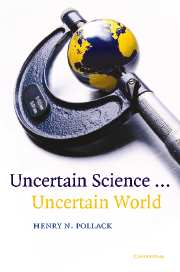Book contents
- Frontmatter
- Contents
- Acknowledgments
- About the author
- 1 Setting the stage
- 2 Uncertain about science
- 3 Can the media help?
- 4 Unfamiliarity breeds uncertainty
- 5 Fever or chill?
- 6 A fifty–fifty chance
- 7 I'm not quite sure how this works …
- 8 Let's see what happens if …
- 9 Reconstructing the past
- 10 Predicting the future
- 11 Out of the blue
- 12 In a climate of uncertainty
- Index
7 - I'm not quite sure how this works …
Published online by Cambridge University Press: 11 August 2009
- Frontmatter
- Contents
- Acknowledgments
- About the author
- 1 Setting the stage
- 2 Uncertain about science
- 3 Can the media help?
- 4 Unfamiliarity breeds uncertainty
- 5 Fever or chill?
- 6 A fifty–fifty chance
- 7 I'm not quite sure how this works …
- 8 Let's see what happens if …
- 9 Reconstructing the past
- 10 Predicting the future
- 11 Out of the blue
- 12 In a climate of uncertainty
- Index
Summary
Perplexity is the beginning of knowledge.
Kahlil GibranThe quantification of measurements through statistical analysis, the discovery of a trend in temperature over time, or observation of a pattern in water pollution data displayed on a map – all motivate scientists to begin thinking and formulating ideas about what process lies behind the relationships they are observing. These ideas are initially simple and rudimentary, and they may lead to later testing through experimentation. In the next two chapters, we will explore the world of conceptualization and experimentation and gain insight into how uncertainty promotes creativity.
Scientists, indeed everyone, always operate with simplified concepts of the way things work. We call these simplified representations ‘models’, and they come in many forms: conceptual, physical, numerical. We receive imperfect guidance in model building from the real world, through incomplete, sometimes inaccurate, and occasionally conflicting measurements or observations about the phenomenon or system we are trying to understand. There is a continuous interaction between models and observation, with each undergoing adjustment in the face of the other. New observations lead to revision of a concept, and a new concept, in turn, suggests new experiments or observations to be made that will again put the concept to a test. It is this iterative back-and-forth interplay that generally improves understanding of a system, and which under some circumstances can reduce the uncertainty associated with system behavior.
Information
- Type
- Chapter
- Information
- Uncertain Science ... Uncertain World , pp. 105 - 126Publisher: Cambridge University PressPrint publication year: 2003
